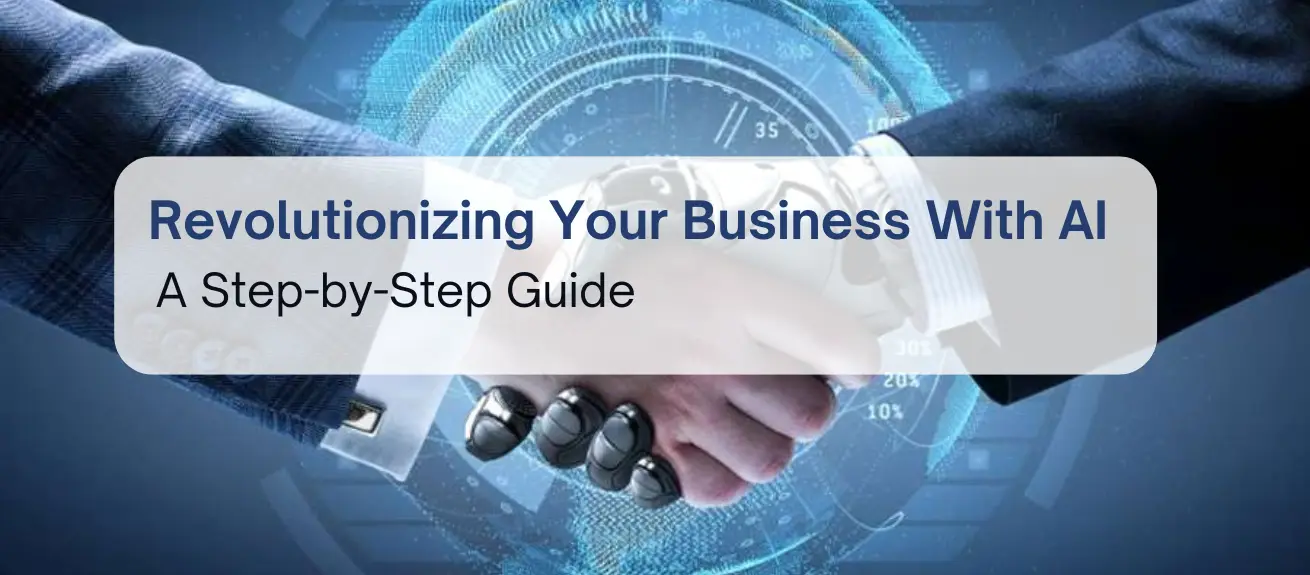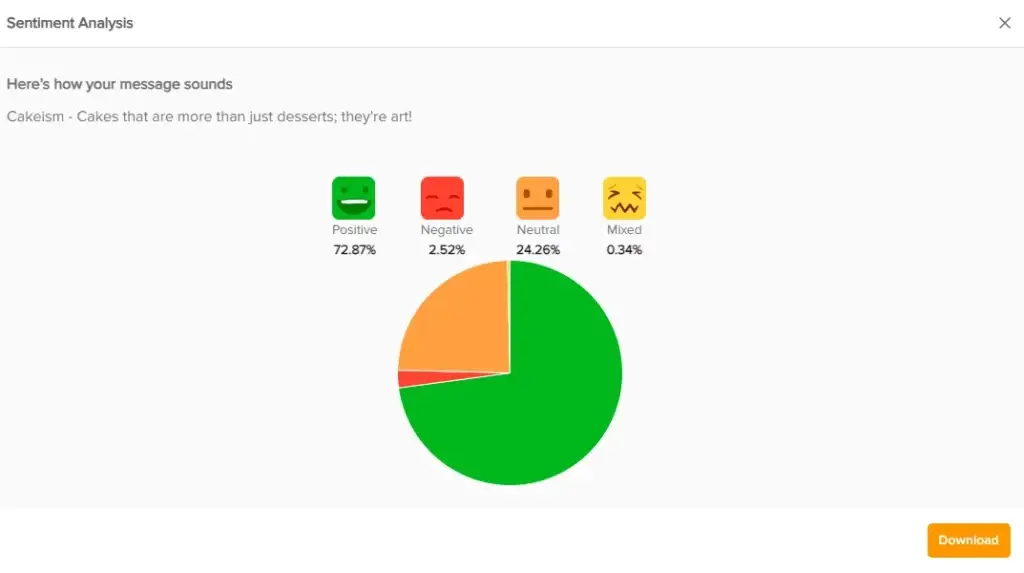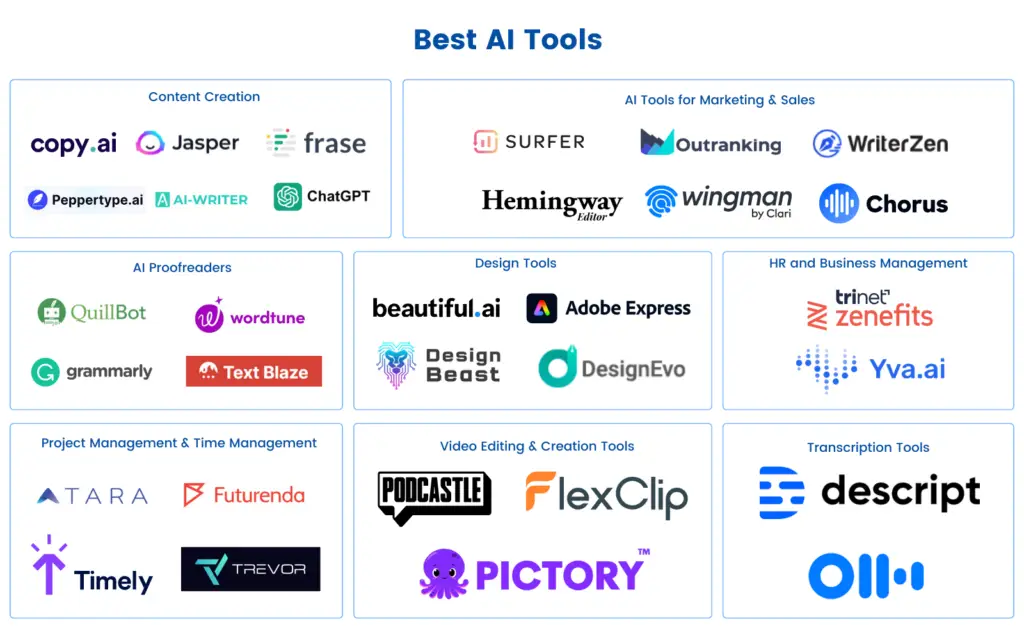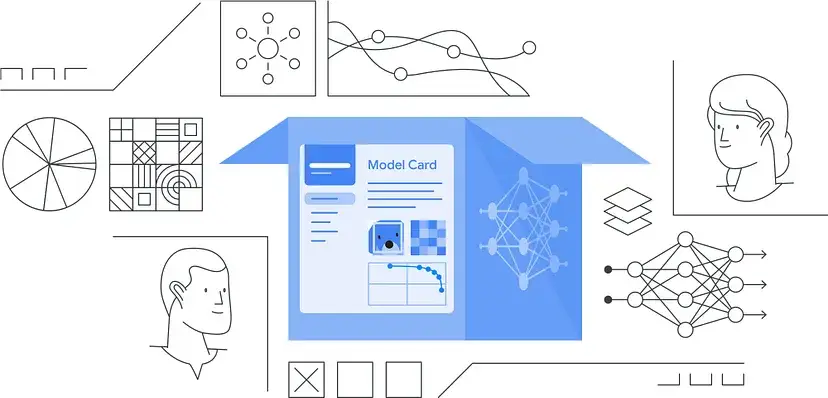
Revolutionizing Your Business with AI: A Step-by-Step Guide
- Date July 23, 2024
Advance Your Business with AI: A Step-by-Step Guide 4
In the modern business climate, accepting Artificial Intelligence (AI) isn’t just a choice; it’s essential for staying successful and developing. This in-depth tutorial will guide you through the steps you need for effectively bringing AI into your business activities and realizing its disruptive power.
To begin with smaller steps here are a few reasons why implementing AI in business will profit an organization:
• Better Decision
Organizations use Artificial Intelligence to gain insights related to their business. To make decisions that are more data driven instead of basing them on pure intuitions which can be personally biased.
• Efficiency and productivity
AI or machines, unlike humans, can work tirelessly for long durations thereby increasing productivity drastically.
• Personalized customer services and experiences
AI analyzes the data to create personalized experiences for different users. This custom experience is all based up on the data of the user.
Being aware of AI's Business Effect
Artificial intelligence (AI) is going to be a pervasive and all-encompassing technology that transforms nearly every industry, including manufacturing, transportation, healthcare, and retail.
Technology that enables devices to handle tasks that typically require human intelligence, such as learning from data, recognizing structures, and making decisions. Its applications include automation ordinary processes to enhance relationships with clients and predicting trends in the market.
The Key Concepts of AI
Within computer science, one of the most innovative and fascinating subfields is artificial intelligence (AI). It’s among the trickiest as well.
The field of AI consists essentially of several areas , including artificial intelligence, natural language processing, and machine learning. These technologies help companies automate tiresome processes, provide individualized experiences at scale, and glean useful data from huge databases.
Uses of AI in Real-World Businesses
Businesses stand to gain a great deal from AI technology, including better customer engagement, data analysis, process automation, strategic recommendations, and improved decision making.
Artificial Intelligence (AI) is used in many corporate domains, including accounting and finance, customer service, cybersecurity, recruitment, sales and marketing, supply chain and logistics, IT operations, and legal. Governments, corporations, and individuals will need to work together more in the future as AI for business becomes more and more integrated into software processes and workflows.
Creating the Foundation for AI Inclusion
It’s critical to evaluate your company’s needs, build an effective team, and choose the best AI technologies according to your goals before diving into the use of AI.
Defining your business needs with clear ideas, Identifying AI usage scenarios for your business and establishing a set of criteria for the usage are a few key steps that help in creating a strong foundation.
Understanding Your Company's Goals
Determine the main areas—such as improving the supply chain, advertising efficacy, and customer service automation—where artificial intelligence can have the biggest influence. Prioritize AI projects in line with strategic objectives by assessing present processes and trouble regions.
Developing Your AI Business
Putting together a cross-team is crucial for the effective application of AI:
- AI specialists are familiar with data analysis, deep learning, and artificial intelligence (AI) tools.
- Professionals with a capacity to analyze data and generate useful insights are known as data analysts.
- Domain Expert’s: People with knowledge unique to their industry who may direct the creation of AI systems.
- IT specialist’s: Making sure AI solutions integrate seamlessly with current IT systems and infrastructure.
Collaboration among these positions enhances the impact of AI projects upon business outcomes by facilitating their efficient installation.
Identifying the Effective AI Techniques and Tools
Finding the right technology and tools for artificial intelligence is essential to getting the results you want:
- Adaptability: Confirm that the AI solutions you choose can expand with the requirements of your business as it does.
- Compatibility: To enable easy integration, evaluate compatibility with current IT systems and technology.
- Security: To protect sensitive data and adhere to legal requirements, give priority to AI systems that have strong security features.
Organization’s might reduce implementation risk’s and enhance return on investment by combining AI investments with technological requirement’s and company target’s
Using AI to Enhance Business Procedures
- Enhancing corporate processes’ using AI improves efficiency, decision-making, and client satisfaction.
- Automation: Free’s up workers by eliminating repetitive chores like scheduling and data entry.
- Data analysis: Offers insights into predictive analytics and smarter decision-making.
- Personalization: Personalizes interactions with customers with suggestions based on data.
- Operational Efficiency: Enhances logistics, inventory, and supply chain activities.
- Cybersecurity: Increases defenses by identifying and neutralizing threats creating a safer and user trustable environment.
- Natural Language Processing: Offers automated interactions and support for clients.
Connectivity Techniques
For evidence of AI viability and worth in regulated settings, begin with pilot programs Before applying AI across more processes, businesses might assess AI efficiency through pilot projects get user input, and enhance methods for implementing it.
Learning and Training
Ongoing instruction and development of abilities ensure that staff have the necessary skills to properly exploit AI, supporting an innovation.
- Empower staff with AI literacy and technical capabilities through training programs and workshops.
- AI Fundamental’s: a discussion of AI values, definitions, and implementations.
- Practical Skill’s: Ability to apply AI tools and platforms to analyze data, design algorithms, and deploy AI solutions.
- Ethical Aspect’s: Learn the ethical implications and guidelines for AI use, such as data privacy, bias mitigation, and algorithm openness.
Analyzing Perfection
- Define the following key performance indicators (KPI) linked with strategic objectives to assess artificial intelligences impact.
- Operating effectiveness indicators include process cycle time, resource usage, and cost reductions.
- Customer experience metrics include customer happiness, retention rates, and individualized supply of services.
- Innovation: Measurable outcomes related to AI-driven insights, product upgrades, and market distinction.
- Regularly monitor and evaluate key performance indicators (KPI) to assess AI performance, find areas for improvement, and justify ongoing artificial intelligence investment.
Avoiding Basic AI Technical Issues
Using AI in businesses might face many challenges, but conquering them is critical for effective integrations:
- Data Quality and Availability: It refers to Make sure the data is clean, relevant, and easily accessible so that AI models can be trained efficiently.
- Skill Gap: To address the shortfall of AI competence, upskill existing staff or hire specialist personnel.
- Connection with Old Systems: To avoid difficulties, integrate artificial intelligence (AI) systems smoothly into existing IT systems.
- Ethical and Legislative Compliance: Know ethical issues and follow legislation regulating data privacy and AI usage.
- Price and the return on investment (Calculate the initial costs and possible returns to justify AI investments and demonstrate value.
- Change Management: Effectively manage organizational change to ensure the acceptance and adoption of AI-driven processes,
By taking steps to address these obstacles, businesses may leverage the full potential of AI to drive.
Data privacy and safety
Implement solid data safety methods to secure sensitive knowledge and ensure regulatory compliance. Encrypt the transfer of information, implement access rules, and conduct regular security audits to reduce the dangers associated with cybersecurity associated with AI installations.
Inclusion Difficulty
Solve connectivity difficulties by employing AI platforms and approaches that work seamlessly with existing IT infrastructure. Engage with IT teams and suppliers to ensure compatibility and reduce disruption during applications.
Using AI to Secure the future of Your Business
While in Business it’s very important to always we aware of changing trends and demands so that proper steps are taken care of for the purpose of futureproofing your business.
- To maintain a competitive advantage in the AI-driven era, use a forward-thinking attitude.
- Continuous Innovation: Invest in R&D to investigate new AI applications, improve current abilities, and capitalize on emerging trends.
- Talent Development: Empower staff to investigate AI potential, explore new technologies, and contribute to organizational growth to foster an innovative and learning culture.
- Strategic collaborations: Partner with AI providers, technology partners, and research institutes to gain access to the latest technologies, industry experience, and collaboration opportunities.
By taking an anticipatory approach to AI adoption and innovation, businesses can future-proof operations, create development, and sustain leadership within increasingly competitive market’s.
Conclusion
The cost varies greatly depending on the size and scope of your AI activities. Small trial initiatives can be relatively inexpensive, however large-scale execution demands a significant expenditure.
Frequently Asked Questions
Welcome to the FAQ section for our blog post on unlocking the secrets of Gen AI and the essential tools required for success. Here are some common questions and answers to help you grasp the essence of this transformative topic:
No, it’s never too late. The field of AI is vast and growing, opening opportunities daily. A bit of Research and any person is good to go and develop a career in AI.
Absolutely! There are scalable AI solutions for organizations of all sizes that prioritize efficiency and customer experiences.
No, every industry, from healthcare to retail, may benefit from artificial intelligence in many ways.
It Varis’s. Some firms notice quick gains in operational efficiency, although strategic benefits, such as customer pleasure, may take longer to manifest.
AI costs for implementation vary depending on project scope, complexity, and technical requirements. Small-scale initiatives, such as pilot projects, can start with a few thousand dollars, whereas enterprise-wide AI adoption can necessitate significant expenditures in technology, training, and infrastructures.
AI is largely used to automate boring jobs, increase productivity and aid in making choices. While AI may replace employment involving repetitive work it additionally presents new opportunities and responsibilities that necessitate human supervision, creativity, and strategic thinkings.
AI ethics involve providing fairness and openness in algorithms, protecting user data privacy, eliminating biases in AI models, and maintaining AI-powered decisions.
Small businesses can benefit from AI by increasing operational efficiency, personalizing interactions with consumers, optimizing marketing strategies, and making data-driven decisions without requiring large-scale investments in technological infrastructure.
AI adoption has the potential to significantly benefit industries such as healthcare, finance (fraud detection and algorithmic trading), retail (inventory management and customer recommendation systems), and manufacturing.
The timescale for seeing benefits from AI implementation varies based on the project’s scope and goals. Some firms may experience rapid improvements in effectiveness or cost reductions, while others could require longer-term strategic benefits such as higher client retention or market competitiveness.
You may also like

AI Skills to Break the Internet: Your Guide to Going Viral!

Unveiling AI Strategies of Millionaires




